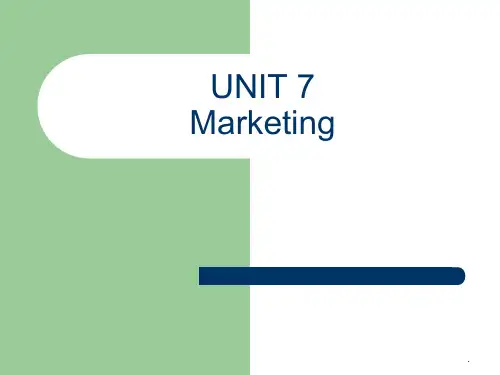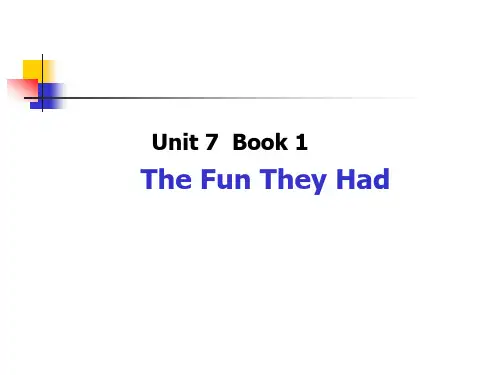新职业英语 综合英语2 Unit 7 ppt课件
- 格式:ppt
- 大小:4.26 MB
- 文档页数:85
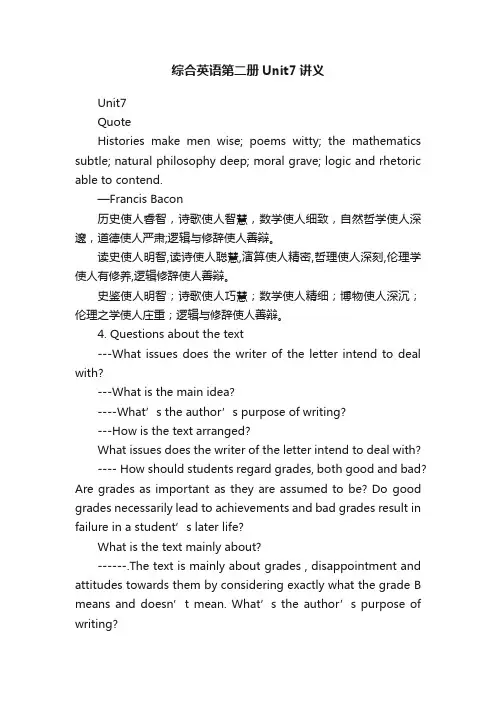
综合英语第二册Unit7讲义Unit7QuoteHistories make men wise; poems witty; the mathematics subtle; natural philosophy deep; moral grave; logic and rhetoric able to contend.—Francis Bacon历史使人睿智,诗歌使人智慧,数学使人细致,自然哲学使人深邃,道德使人严肃;逻辑与修辞使人善辩。
读史使人明智,读诗使人聪慧,演算使人精密,哲理使人深刻,伦理学使人有修养,逻辑修辞使人善辩。
史鉴使人明智;诗歌使人巧慧;数学使人精细;博物使人深沉;伦理之学使人庄重;逻辑与修辞使人善辩。
4. Questions about the text---What issues does the writer of the letter intend to deal with?---What is the main idea?----What’s the author’s purpose of writing?---How is the text arranged?What issues does the writer of the letter intend to deal with?---- How should students regard grades, both good and bad? Are grades as important as they are assumed to be? Do good grades necessarily lead to achievements and bad grades result in failure in a student’s later life?What is the text mainly about?------.The text is mainly about grades , disappointment and attitudes towards them by considering exactly what the grade B means and doesn’t mean. What’s the author’s purpose of writing?----to tell his student that he should view his grades and his disappointment correctly.What type of writing is this essay?-----argumentation.Apart from the first paragraph, the rest of the text falls clearly into three parts, each of which is marked at the beginning by a key word or words. Try to find these key words.----Paragraphs 2–5:Disappointment-----Paragraphs 6-8:The student as performer; the student as human being.-----Paragraphs 9-10:PerspectivePart 1 (paragraph 1)Understanding the paragraph:1) What does this part mainly talk about?2) What change about grades has the author mentioned briefly?3)What, according to the author, has caused the feeling of disappointment?4) Has the author stated his purpose of writing in this paragraph? If yes, what is it? If not, where is it stated in the text?Main idea of this part:It introduces the topic of the letter: grade B for the course and the feeling of disappointment.What change about grades has the author mentioned briefly?----The author has mentioned briefly the change in the way grades are regarded, i.e. the norm has shifted upward.What, according to the author, has caused the feeling of disappointment?-----It has to do with the general social climate where grades determine eligibility for graduate school and special programs. This is why the author says there is nothing he can do to remove the feeling of disappointment.Has the author stated his purpose of writing in this paragraph? If yes, what is it? If not, where is it stated in the text?----- The purpose of writing the letter is not stated in this paragraph. It is not specifically mentioned until the third paragraph.I’m certain that nothing I can say will remove that fe eling of disappointment, particularly in a climate where grades determine eligibility for graduate school and special program. (Paragraph 1)Translation:我肯定无论我说什么都不会消除你的沮丧心情,特别是在我们生活的环境中,考试分数直接决定你是否有资格读研究生和申请一些特别的学习项目。
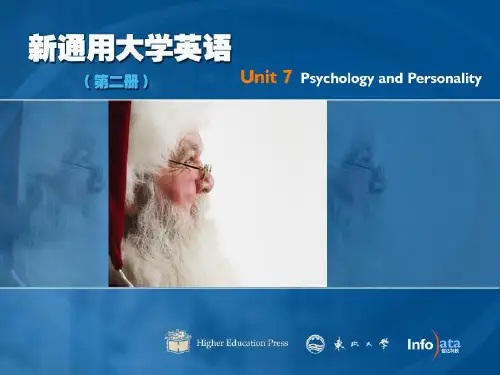
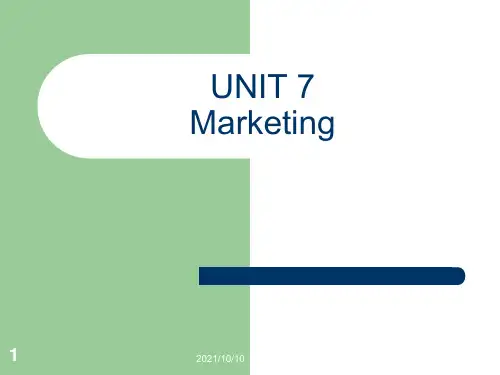
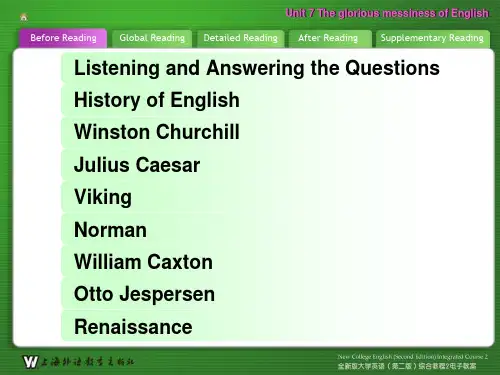
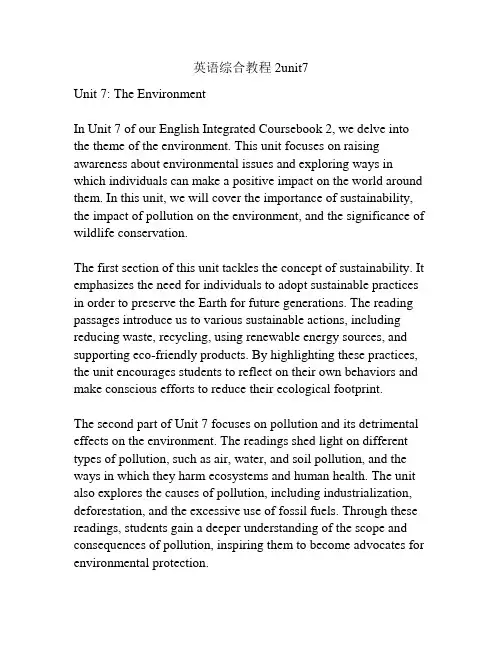
英语综合教程2unit7Unit 7: The EnvironmentIn Unit 7 of our English Integrated Coursebook 2, we delve into the theme of the environment. This unit focuses on raising awareness about environmental issues and exploring ways in which individuals can make a positive impact on the world around them. In this unit, we will cover the importance of sustainability, the impact of pollution on the environment, and the significance of wildlife conservation.The first section of this unit tackles the concept of sustainability. It emphasizes the need for individuals to adopt sustainable practices in order to preserve the Earth for future generations. The reading passages introduce us to various sustainable actions, including reducing waste, recycling, using renewable energy sources, and supporting eco-friendly products. By highlighting these practices, the unit encourages students to reflect on their own behaviors and make conscious efforts to reduce their ecological footprint.The second part of Unit 7 focuses on pollution and its detrimental effects on the environment. The readings shed light on different types of pollution, such as air, water, and soil pollution, and the ways in which they harm ecosystems and human health. The unit also explores the causes of pollution, including industrialization, deforestation, and the excessive use of fossil fuels. Through these readings, students gain a deeper understanding of the scope and consequences of pollution, inspiring them to become advocates for environmental protection.The final section of this unit delves into wildlife conservation. It highlights the importance of preserving biodiversity and protecting endangered species. Students learn about the threats facing wildlife, such as habitat loss, illegal hunting, and climate change. The unit raises awareness about the role individuals can play in wildlife conservation, such as participating in community projects, supporting conservation organizations, and promoting sustainable tourism.To reinforce the knowledge acquired throughout this unit, students engage in various activities, including group discussions, presentations, and research projects. These activities enable students to delve deeper into the topics and develop critical thinking skills. Additionally, the unit includes vocabulary and grammar exercises that further reinforce students' language proficiency.In conclusion, Unit 7 of our English Integrated Coursebook 2 provides comprehensive coverage of the environment and its related issues. By delving into sustainability, pollution, and wildlife conservation, this unit fosters a deeper understanding of the importance of protecting our planet. Through engaging readings, activities, and exercises, students are equipped with the knowledge and skills necessary to become active participants in environmental protection.。
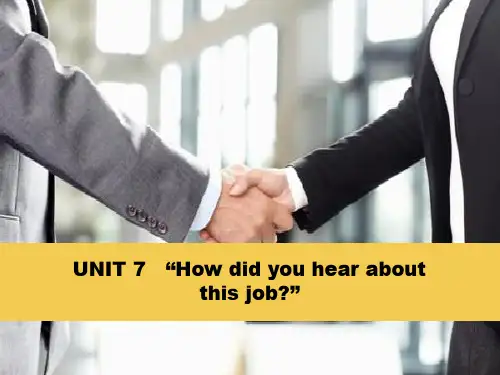

综合英语2unit7Unit 7 The ChaserSection One Pre-reading Activities (1)I. Audiovisual Supplement (1)II. Cultural Background (2)Section Two Global Reading (3)I. Text Analysis (3)II. Structural Analysis (3)Section Three Detailed Reading (4)I.Text 1 (4)II. Questions (6)III. Words and Expressions (7)IV. Sentences (9)Section Four Consolidation Activities (10)Ⅰ. Vocabulary (10)Ⅱ. Grammar (12)Ⅲ. Translation (15)Ⅳ. Exercises for In tegrated Skills (17)Ⅴ. Oral Activities (18)Ⅵ. Writing (19)Section Five Further Enhancement (20)I. A Lead-in Question (20)II. Text 2 (20)III. Memorable Quotes (24)Section One Pre-reading ActivitiesI. Audiovisual SupplementWatch the video clip and answer the following questions. Script:Man: It has been three years since our first date. Time hasreally gone by fast.Woman: Yep.Man:And over the past few weeks, I have been doing some thinking, mainly thinking about the human condition. A lot of life comes down to making sacrifices and deciding which direction is my life gonna go. Could you please leave? Thank you very much.Woman: Are you OK?Man: Yeah.Woman: OK?Man: A lot of life comes down to deciding what am I willing to sacrifice because obviously if you choose one path in life, well, you know, you can’t choose the other. That’s kind of where I found myself lately, ever since we, you and I, in our relationship, en, have reached that place. Woman: That place.Man: The upshot is ―you win.‖Woman:―You win‖? Was that a proposal?Man:You win was just the last part of it. The whole thing was a proposal. The ―you win‖had a context. Aren’t you even gonna look at it?Woman: But, first, can we just, can we retrace the mental steps that led to ―you win‖? Lik e when you say you and I have reached that place. What place?Man: You know what I mean. Shit or get off the pot?Woman: Did you really just say ―shit or get off the pot‖? Right here in the starlight room?Man: What is a big deal?Woman: Why can’t you just cay ―fish or cut bait‖?Man: Because we always say ―shit or get off the pot.‖ Everybody says ―shit or get off the pot.‖Woman: Not in the Starlight Room!Man: What is it with the Starlight Room?Woman: Magic, Jimmy. Romance. You know, the whole reason why you come up here to propose.You see the lights in the city. You have a wonderful meal. You listen to beautiful music. And it casts this romantic spell. When you say ―shit or get off the pot‖, all the magic just suddenly disappears. Now all you have left is bowel trouble.Man: I am sorry. I didn’t think you’d get so upset over a figure of speech.Woman: It’s not the words, Jimmy. It’s the whole approach. God, it’s as if you deliberately …Man: What? What?Woman: You don’t want to marry me, do you?Man: I just proposed to you.Woman: Yeah, but the way that you proposed, you weren’t asking me to marry you. You were asking me to say no.Man: Just put it on. All right? Please.Woman: If you don’t want to marry me, Jimmy, I don’t want to be married to a guy who d oesn’t want to get married.Questions (在每个问题下面设置按钮,点击以后出现正确答案)1. Why does the man choose to propose to his girlfriend in the Starlight room?Answer: It is because the Starlight room is a romantic and magic place to propose.2. Why does the woman say no to his proposal?Answer: It is because she feels he is not ready for marriage.II. Cultural Background1. Proposal of Marriage●The proposal of marriage is an event where one person ina relationship asks for the other's handin marriage.●If accepted, it ma rks the initiation of engagement.●It often has a ritual quality, sometimes involving the presentation of an engagement ring and aformalize d asking of a question such as ―Will you marry me?‖●Often the proposal is a surprise.●In many Western cultures, t he tradition has been for the man to propose to the woman.2. Engagement●An engagement is a promise to marry, and also the period of time between proposal andmarriage – which may be lengthy or trivial.●During this period, a couple is said to be affianced, betrothed, engaged to be married, or simplyengaged.●Future brides and grooms are often referred to as fiancée or fiancés respectively (from the Frenchword ―fiancé‖).●The duration of the courtship varies vastly.●Long engagements were once co mmon in formal arranged marriages.●In 2007, the average engagement time in the United States was 17 months, but the figure aroundthe world varies greatly depending on culture and customs.Section Two Global ReadingI. Text AnalysisThe short story is a fable of love with a strong sarcastic tone. The protagonist, Alan Austen, wants to find an easy solution to the problem of love by purchasing a love potion. However,it’s not the love potion that the old man intends to sell primarily, but ―life cleaner‖.The theme of ―The Chaser‖ is the cynicism of experience, portrayed on a field of Alan’s y outhful naivety and the old man’s pessimistic certainty.The title of this short story is somehow a pun. ―A chaser‖ can be a person that pursues someone like in ―a woman chaser‖. In addition, it can refer to a weaker alcoholic drink taken after a strong one. A whisky, like the potion, intoxicates. A beer chaser, like the ―life cleaner‖, mollifies the harshness of the spirits. The potion and the poison go together like a strong alcoholic drink and a chaser..II. Structural AnalysisThis short story, which combines elements of horror and love, is built almost entirely through dialogue between a young man, Alan Austen, who is deeply in love and wants to possess his lover entirely, and an unnamed old man who believes in a life free ofromantic involvement.In ―The Chaser‖ John Collier uses:●the dramatic irony of the title to initialize a cynical landscape;●and the understatement of the ending to enclose the cynical world of the old man, a world whichAlan is entering.Paragraph 1: In this part, the protagonist, Alan Austen, has been introduced.Paragraphs 2-12: The old man is trying to sell his mixture.Paragraphs 13-45: Austen got to know about the love potion and in the end bought it.Section Three Detailed ReadingI.Text 1The ChaserJohn Collier1 Alan Austen, as nervous as a kitten, went up certain dark and creaky stairs in the neighborhood of Pell Street, and peered about for a long time on the dim hallway before he found the name he wanted written obscurely on one of the doors.2 He pushed open this door, as he had been told to do, and found himself in a tiny room, which contained no furniture but a plain kitchen table, a rocking-chair, and an ordinary chair. On one of the dirty buff-coloured walls were a couple of shelves, containing in all perhaps a dozen bottles and jars.3 An old man sat in the rocking-chair, reading a newspaper. Alan, without a word, handed him the card he had been given. ―Sit down, Mr. Austen,‖ said the old man very politely. ―I am glad to make your acquaintance.‖4 ―Is it true,‖ asked Alan, ―that you have a certain mixturethat has … er … quite extraordinary effects?‖5 ―My dear sir,‖replied the old man, ―my stock in trade is not very large —I d on’t deal in laxatives and teething mixtures —but such as it is, it is varied. I think nothing I sell has effects which could be precisely described as ordinary.‖6 ―Well, the fact is …‖ began Alan.7 ―Here, for example,‖interrupted the old man, reaching f ora bottle from the shelf. ―Here is a liquid as colourless as water, almost tasteless, quite imperceptible in coffee, wine, or any other beverage. It is also quite imperceptible to any known method of autopsy.‖8 ―Do you mean it is a poison?‖ cried Alan, very much horrified.9 ―Call it a glove-cleaner if you like,‖ said the old man indifferently. ―Maybe it will clean gloves.I have never tried. One might call it a life-cleaner. Lives need cleaning sometimes.‖10 ―I want nothing of that sort,‖ said Alan.11 ―Probably it is just as well,‖said the old man. ―Do you know the price of this? For one teaspoonful, which is sufficient, I ask five thousand dollars. Never less. Not a penny less.‖12 ―I hope all your mixtures are not as expensive,‖ said Alan apprehensively.13 ―Oh dear, no,‖said the old man. ―It would be no good charging that sort of price for a love potion, for example. Young people who need a love potion very seldom have five thousand dollars. Otherwise they would not need a love potion.‖14 ―I am glad to hear that,‖ said Alan.15 ―I look at it like this,‖ said the old man. ―Please a customer with one article, and he will come back when he needs another.Even if it is more costly. He will save up for it, if necessary.‖16 ―So,‖ said Alan, ―you really do sell love potions?‖17 ―If I did not sell love potions,‖ said the old man, reaching for another bottle, ―I should not have mentioned the other matter to you. It is only when one is in a position to oblige that one can afford to be so confidential. ―18 ―And these potions,‖ said Alan. ―They are not just … just… er …‖19 ―Oh, no,‖ said the old man. ―Their effects are permanent, and extend far beyond the mere casual impulse. But they include it. Oh, yes they include it. Bountifully, insistently. Everlastingly.‖20 ―Dear me!‖ said Alan, attempting a look of scientific detachment. ―How very interesting!‖21 ―But consider the spiritual side,‖ said the old man.22 ―I do, indeed,‖ said Alan.23 ―For indifference,‖ said the old man, ―they substitute devotion. For scorn, adoration. Give one tiny measure of this to the young lady —its flavour is imperceptible in orange juice, soup, or cocktails —and however gay and giddy she is, she will change altogether. She will want nothing but solitude and you.‖24 ―I can hardly believe it,‖ said Alan. ―She is so fond of parties.‖25 ―She will not like them any more,‖ said the old man. ―She will be afraid of the pretty girls you may meet.‖26 ―She will actually be jealous?‖ cried Alan in a rapture. ―Of me?‖27 ―Yes, she will want to be everything to you.‖28 ―She is, already. Only she doesn’t care about it.‖29 ―She will, when she has taken this. She will care intensely. You will be her sole interest in life.‖30 ―Wonderful!‖ cried Alan.31 ―She will want to know all you do,‖ said the old man. ―All that has happened to you during the day. Every word of it. She will want to know what you are thinking about, why you smile suddenly, why you are looking sad.‖32 ―That is love!‖ cried Alan.33 ―Yes,‖ said the old man. ―How carefully she will look after you! She will never allow you to be tired, to sit in a draught, to neglect your food. If you are an hour late, she will be terrified. She will think you are killed, or that some siren has caught you.‖34 ―I can hardly imagine Diana like that!‖ cried Alan, overwhelmed with joy.35 ―You will not have to use your imagination,‖ said the old man. ―And, by the way, since there are always sirens, if by any chance you should, later on, slip a little, you need not worry. She will forgive you, in the end. She will be terribly hurt, of course, but she will forgive you —in the end.‖36 ―That will not happen,‖ said Alan fervently.37 ―Of course not,‖ said the old man. ―But, if it did, you need not worry. She would never divorce you. Oh, no! And, of course, she will never give you the least, the very least, grounds for —uneasiness.‖38 ―And how much,‖ said Alan, ―is this wonderful mixture?‖39 ―It is not as dear,‖ said the old man, ―as the glove-cleaner, or life-cleaner, as I sometimes call it. No. That is five thousand dollars, never a penny less. One has to be older than you are, to indulge in that sort of thing. One has to save up for it.‖40 ―But the love potion?‖ said Alan.41 ―Oh, that,‖said the old man, opening the drawer in the kitchen table, and taking out a tiny, rather dirty-lookingphial. ―That is just a dollar.‖42 ―I can’t tell you how grateful I am,‖ said Alan, watching him fill it.43 ―I like to oblige,‖ said the old man. ―Then customers come back, later in life, when they are better off, and want more expensive things. Here you are. You will find it very effective.‖44 ―Thank you again,‖ said Alan. ―Good-bye.‖45 ―Au revoir,‖ said the man.II. Questions1. What is the image of Alan Austen in the first part? (Paragraph 1)Alan Austen is depicted as a timid, skeptical and hesitant character. Through descriptions like ―as nervous as a kitten,‖ ―peering about for a long time on the dim hallway‖, the writer creates a sense of apprehension.2. Why do you think the old man told Austen about the life-cleaner before selling the love potion? (Paragraph 7) The sophisticated old man had encountered many young men who had been in the grip of romantic desire before, but who eventually got tired of the possessive love they had experienced. He knew for sure tha t Austen’s possessive love wouldn’t last long. It would eventually bore and repel him. He expected that when his enthusiastic passion changed into hatred, Austen would come to him again, because he ha d already seen those disillusioned customers return to buy the ―chaser‖ so that they could be free from the women for whom they had previously bought the love potion.3. What is the implied meaning of the old man’s remark, ―Young people who need a love po tion very seldom have five thousand dollars. Otherwise they would not need a lovepotion‖ (Paragraph 13)? What the old man means is that a young man who falls in love one-sidedly is seldom rich enough to win a girl’s heart; if he were rich enough, it would be much easier for him to win th e girl’s hand. His words imply that money is one of the crucial factors for love. If a man is not rich, he can rarely expect to be loved by a girl.4. What is Austen’s understanding of love? (Paragraph s 23-32)Austen was filled with illusions and unrealistic expectations of love. To him, love meant the entire possession of the lover. When the old man talked about the magic effect of the love potion and described the expectant possessive love, Austen cried ―That is love!‖, which suggests that he was overwhe lmed with joy.5. What does the old man’s remark in Paragraph 39 ―… one has to be older than you are, to indulge in that sort of thing‖ mean?Young people tend to be over-passionate for love, sometimes senselessly and irrationally, while the old, just like the old man who sells the mixtures, would take a cool and sensible, sometimes even cynical attitude toward love.Class ActivityRole play●Work in pairs and role play the dialogue.●Make sure you’ve tried your best to learn the lines by heart.●You can al so ask a fellow student to supply a prompt.●Then discuss with each other how you understand the two roles in the story.III. Words and ExpressionsParagraph 1peer v.look very carefully or hard, especially as if not able to see clearlye.g. She sat next to me, peering through the windscreen.Comparison: peer & peeppeep: look at sth. quickly and secretly, esp. through a hole or other small openinge.g.His door was ajar and she couldn’t resist peeping in.Paragraphs 2-12make sb’s acquaintancemeet sb. for the first timee.g. That evening he made the acquaintance of a young actress.laxatives and teething mixturesLaxatives (or purgatives) are foods, compounds, or drugs taken to induce bowel movements, most often taken to treat constipation.Teething mixture is a preparation which consists of a syrup designed to cure the teething pain. imperceptible a.that cannot be noticed or felt because so small, slight or graduale.g. an imperceptible change in temperatureMartha’s hesitation was almost imperceptibleDerivations:perceive (v.), perception (n.), perceptible (a.), imperceptible (a.), imperceptibly (ad.)autopsy n.the examination of a dead body to determine the cause of deathe.g. S ince the family opposed an autopsy, the death was officially listed as drowning.They carried out/performed an autopsy.Synonym:post-mortemapprehensively ad.full of anxiety about the futuree.g. They looked at each other apprehensively.Derivations:apprehensive (a.), apprehension (n.)Practice:(制作的时候先出现中文,每句中文下面设置按钮,点击以后出现对应的英文翻译)每次儿子骑摩托车出门,她都会担心儿子的安全问题。
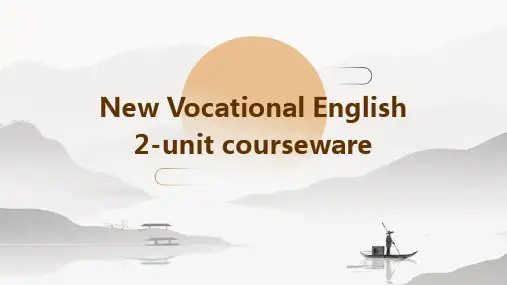
![[外语课件]新职业英语职业综合英语第二册Unit7(可编辑)](https://uimg.taocdn.com/c1fa19056fdb6f1aff00bed5b9f3f90f76c64d8e.webp)
Warm-2-Notes Sample L-4-Script Task 4 Script Listening & Speaking 声音 L-Task 5-1 Task 5 Listen to the passage twice and fill in the blanks with what you hear. Listening & Speaking According to the Center for Exhibit Industry Research, the majority of trade fair attendees are decision makers or influencers who plan to make a purchase. Following are the guidelines to help make sure one is ready to _______________. Avoid soft sells and be engaging: Trade fairs require a hard-sell approach. When attendees show interest in your booth, approach them immediately. Present your professionalism and willingness to help and avoid greetings like “Can I help you”. Instead, ______________________―“What information can I tell you ab out our new heating system?” Watch your manners: Don’t sit down. Don’t eat, drink, or smoke at the booth. Never leave your booth unattended. Don’t spend time chatting with colleagues instead of ________________________. sell effectively ask a direct question focusing on customers 声音 L-Task 5-2 Qualify prospects quickly: The first thing you should do once you meet someone new is to find out who they are and where they’re located. You can find this information out by requesting ________________. Ask lots of questions: Engage a prospect by asking open-ended questions―ones that require more than a yes or no answer. This will help you determine theirneeds and interests. Keep good records: Write down all therelevant informati on about a prospect on a “lead card” which containshis or her needs, interests, _________________. Use this card for yourpost-show follow-up when you return to the office. Listening & Speaking a business card budget and timing 声音 Writing Writing Task 1 Task 2Task 3 W-Task-1 Writing Task 1 Look at the following advertisements anddiscuss the questions below with your partner. Q1 Q2 W-1-Q1Writing What does each advertisement sell? Sample 1 is a public service advertisement (公益广告), warning the consequence of drunk driving.Sample 2 is a hair gel advertisement, showing the effect after using theproduct. Sample 3 is also a public service advertisement, warning parentsto take care of their children in the swimming pool. Sample 4 is a mobilephone advertisement showing the special musical feature of the product.W-1-Q2 Writing What is the slogan used in each advertisement? Sample 1:Reserved for Drunk Drivers Sample 2: Tames the Wildest Hair Sample 3: WatchAround Water Sample 4: Express Your Musical Side W-Task-2-1 Writing Task2 Translate the following advertisements slogans into Chinese.Time always follows me. 2. Good to the last drop. 3. A diamond lastsforever. 4. Start ahead. 时间永随我。
